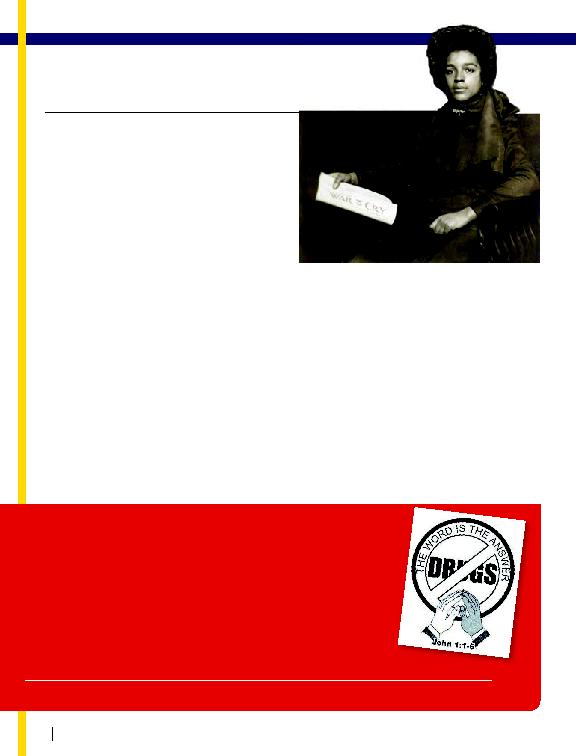
The War Cry | FEBRUARY 2016
34
B
ooker T. Washington (1856-1915) was a former
slave and subsequent educator, author, orator,
advisor to presidents and leader in the African
American community. He once said, "I have always
had the greatest respect for the work of The Salvation
Army, especially because I have noted that it draws no
color line in religion."
The Salvation Army has a long history of pushing religious
conventions, with an emphasis on placing women and people of
color in leadership positions.
The Army was established in London during the same year the
American Civil War ended: 1865. Slavery had been abolished, but
equality was far from reality. One of the Army's early ministry efforts
in America was carried out in Cleveland, Ohio, in 1872, when a recent
immigrant and Salvation Army convert named James Jermy joined
forces with James Fackler, a black Methodist preacher. Their ministry
grew rapidly, and they opened five outposts. The ministry later
dissolved due to health and financial issues.
The Army officially opened its work in the United States in 1880,
when George Railton and seven young women, the "Hallelujah
Lassies," landed in New York's Battery Park. The Salvation Army
commissioner at the time, Frank Smith, denounced the color
line when he said the Army "must be among the first Christian
communities of America who will faithfully and wholly break down
the wall of partition separating the white from the colored, whom
the Lord has brought from a common captivating bondage."
Mabel Broome was drawn to the Army in the early 1900s by the
fervor of its preachers and its relentless social outreach. She became
a soldier of the Chicago #3 Corps. She then answered the call to
become Salvation Army officer. On July 20, 1915, after six months
a soldier of the Chicago #3 Corps and then answered the call to
become Salvation Army officer. On July 20, 1915, after six months
of training, Broome became the first African American officer in the
Army's Central Territory.
When Broome was assigned to Chicago #2 Slums, she took on
the tough duties of the "slum sisters," visiting houses, scrubbing
floors, caring for new mothers and their babies, mending clothes,
distributing food and ministering to the sick and shut�ins.
Slum-sister officers were also responsible for nightly worship
services, open�air evangelistic meetings and visits to brothels and
saloons to share the gospel and sell the War Cry. They often faced
unresponsive crowds and open hostility. For Broome, in a highly
segregated country, these duties must have been extremely difficult.
In 1918, Broome resigned as an officer, likely because of delicate
health. She later returned to the work and accepted a reassignment
to the Army's USA Eastern Territory, where she served at the Boston
Rescue Home until her early death in 1930.
--Sources: http://multiculturalministriescentral.org,
"A Gideon of the Chicago Slums" by Karen Young.
Essence
BLACK HISTORY MONTH
Across the Color Line
Intercessors Wanted for Just Pray No!
C
hristians around the world unite will unite in intercessory prayer on behalf of addicts
and their families on April 2 and 3 for the 26th Annual "Just Pray NO!" Worldwide
Weekend of Prayer and Fasting.
Alcoholism and other drug addictions have devastated families and communities
worldwide. "Just Pray NO!" seeks to enlist millions of prayer warriors from around the
world to pray in Spirit and truth. It also seeks individuals and groups willing to commit to
pray weekly on behalf of addicts and their families and then join with multitudes of other
committed Christians from around the world in prayer and fasting during the weekend of
April 2 to 3.
Prayers will also be raised for the release of those bound by pornography, gambling,
obesity and smoking.
To learn how groups can participate in the annual prayer event visit www.justprayno.org or email [email protected].
Mabel Broome
34-35_Essence_WCFeb16_EDIT.indd 1
1/11/16 4:22 PM
